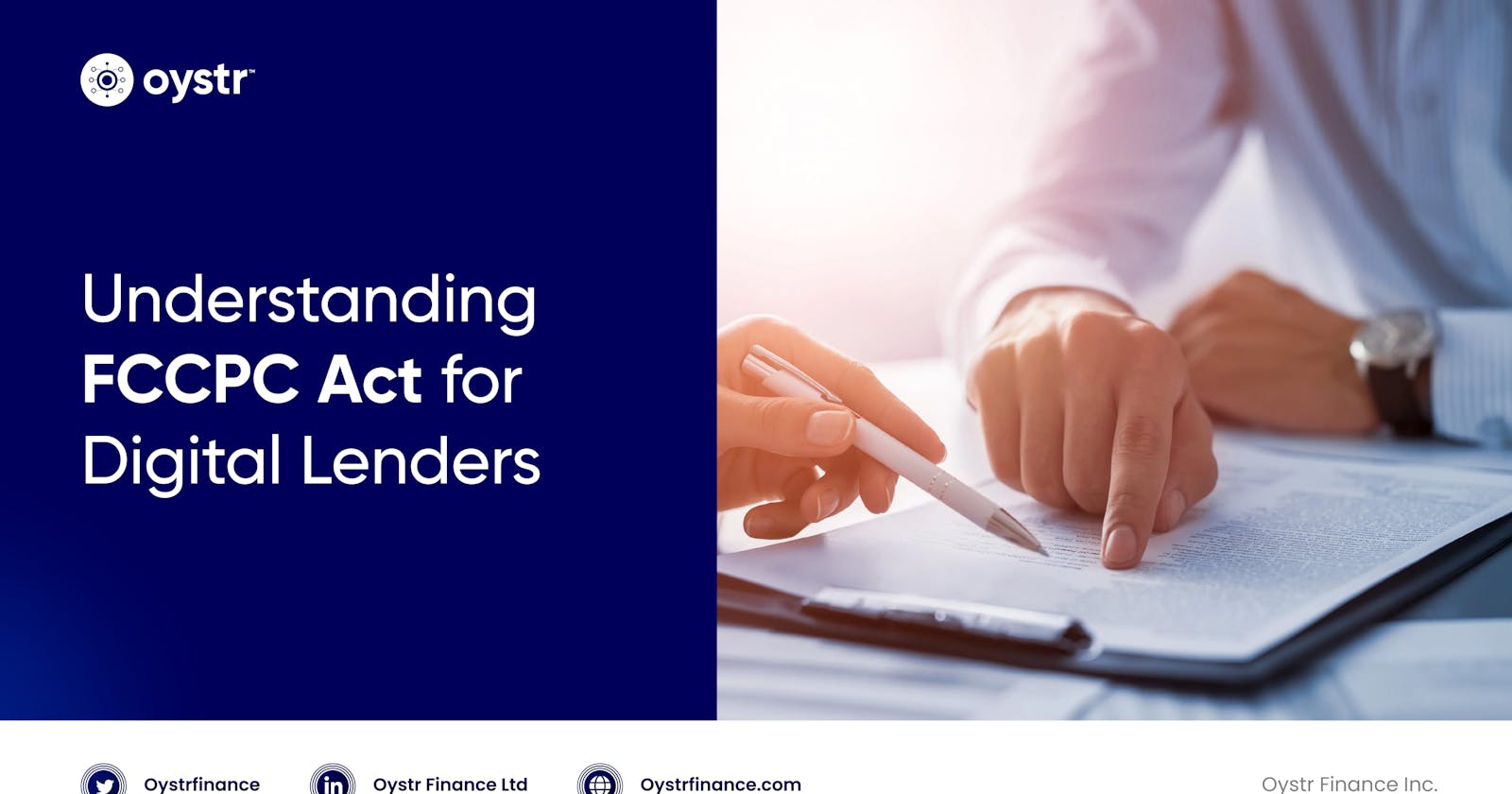In recent years, the digital lending business in Nigeria has seen a spike, with various lending apps and platforms developing to provide consumers with simple and accessible credit facilities.
However, the industry's rapid growth has resulted in numerous cases of unethical practices such as exorbitant interest rates, violation of consumer privacy, and other unfair lending practices.
In response to these concerns, the Federal Competition and Consumer Protection Commission (FCCPC) has created a Limited Interim Regulatory/Registration Framework for Digital Lending to guide digital lenders while also protecting consumers' interests.
The FCCPC Act is one such regulation that can be complex and confusing. In this article, we'll break down what the FCCPC Act is, who it applies to, and what steps digital lenders can take to stay compliant and avoid penalties.

Understanding the Basics of the FCCPC Act
The FCCPC Act, or Federal Competition and Consumer Protection Act, is a regulation that was enacted in Nigeria in 2019. It aims to promote fair competition and protect consumers from unfair trade practices. The act applies to all businesses operating in Nigeria, including digital lenders. It is important for digital lenders to understand the basics of the FCCPC Act to ensure they are operating within the law and avoiding penalties.
FCCPC Requirements for Digital Lenders
The FCCPC requirements for digital lenders are designed to ensure that lenders comply with the law and protect consumers from predatory lending practices. Here are a few requirements for lenders in Nigeria.
Lenders Information
The Act requires lenders to provide information about their physical address, phone number, email address, website, identity and nationality of promoters and directors, and details about funding sources. You’ll have to have to disclose all the necessary basic information about your lending organization to enable customers to trust you and verify your existence.
Implement Clear and Transparent Terms and Conditions
One of the key requirements of the FCCPC Act for digital lenders is to provide clear and transparent terms and conditions to their customers. This means that all fees, charges, and interest rates must be clearly stated and easily understandable.
As a lender, you’ll have to disclose your interest rates, all applicable loan fees, and loan balance calculation methods, as well as any license authorizing their business to lend.
Additionally, any changes to the terms and conditions must be communicated to customers in a timely and clear manner. By implementing clear and transparent terms and conditions, digital lenders can build trust with their customers and avoid any potential legal issues.

Obtain Necessary Licenses and Registrations
Digital lenders must ensure they have obtained all necessary licenses and registrations to operate legally under the FCCPC Act. This includes registering with the Corporate Affairs Commission (CAC) and obtaining a license from the Central Bank of Nigeria (CBN). Failure to obtain these licenses and registrations can result in penalties and legal issues.
Protect Customer Data and Privacy
Digital lenders must prioritize protecting customer data and privacy to comply with the FCCPC Act. This includes implementing strong security measures to prevent unauthorized access to customer information and ensuring that customer data is only used for legitimate purposes. Digital lenders should also have clear policies and procedures in place for handling customer complaints and resolving disputes related to data privacy and security. By prioritizing customer data and privacy, digital lenders can build trust with their customers and avoid potential legal issues.
Stay up-to-date with Regulatory Changes and Compliance Requirements
The FCCPC Act is a dynamic regulatory environment, and digital lenders must be informed of any changes or updates to compliance standards.
Policies and procedures must be reviewed and changed on a regular basis to ensure compliance with current rules and to keep up to date with any new laws or standards that may affect your firm. As a digital lender, you should consider working with legal and compliance experts to ensure they are fully compliant and avoid any potential penalties or legal issues.

Consequences of Failing to Meet FCCPC Regulations As a Nigerian Lender
Nigerian digital lending platforms need to consider the costs of noncompliance with FCCPC regulations. The FCCPC is authorized to investigate and impose penalties on any financial institution found to be in violation of the rules. If you're not in accordance with Nigeria's FCCPC Regulations, you could face the following consequences:
1. Heavy Fines and Penalties
The FCCPC has the authority to impose severe fines and punishments on online lenders who act illegally. These costs could be rather high, posing a serious risk to the lender's business model. The fines and penalties that may be imposed typically depend on the seriousness of the violation.
2. Loss of Lending License
If the FCCPC determines that a digital lender is operating illegally, it can revoke the lender's business license. This could force the financial institution out of Nigeria. If a lender loses its license, it can ruin its reputation and make it impossible for it to attract new investors and business partners.
3. Loss of Customer’s Trust
Digital lenders who fall short of FCCPC standards risk their customers' mistrust. Lender revenue and long-term profitability could take a hit if customers lose confidence in doing business with them. Digital lenders should take measures to ensure they are meeting all regulatory norms to maintain client trust because it might be tough to restore.
Conclusion
The FCCPC's Limited Interim Regulatory/Registration Framework for Digital Lending is a significant step towards regulating the digital lending industry in Nigeria and protecting the interests of consumers.
While there are concerns about the FCCPC's regulatory authority, digital lenders must understand and comply with the framework to avoid facing sanctions and penalties.
By adopting fair and transparent lending practices and providing consumers with clear dispute-resolution channels, digital lenders can build trust with their customers and contribute to the growth and development of the digital lending industry in Nigeria.
With Oystr Float, we can help you handle all aspects of your digital lending business including loan origination, risk analysis, disbursement, recovery, and more. Visit www.oystrfinance.com

